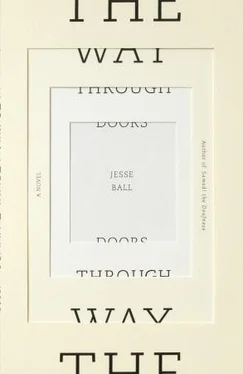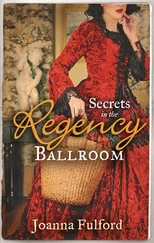— Well…said the young man.
— You’re looking for a girl, said the guess artist. You had hoped she would be on the boardwalk, but she’s not. She’s upstairs somewhere, you think, though you don’t know where.
— Well, said the young man again, I think—
— But, continued the guess artist, you’re worried that you won’t be able to find her alone, and in truth, you will not be able to find her alone. She is too hard to find. You will need help. Somehow you knew that I was the only one who could help you. That’s why you’ve come here every day for the last week and stood over there watching me. Also, just now you noticed my chocolate-chip cookie and you want a bite. Ask me for a piece.
— Can I have a piece of your chocolate-chip cookie? asked the young man.
— Yes, said the guess artist. And, I will help you find this girl.
He broke the cookie into two halves. When he did this, the cookie broke beautifully. The substance it was made of was quite obviously the most extraordinary substance that one could make a chocolate-chip cookie from and still call it a chocolate-chip cookie. The two ate the cookie in silence. When they were done, the young man said,
— That’s the best chocolate-chip cookie I have ever eaten, or seen.
— Let’s go, said the guess artist. There isn’t much time. Do you have anything to show me, any clues to where she might be?
The young man slid an envelope out of his sleeve. He did it so quickly and well that the guess artist smiled at the artfulness of the gesture. There was a letter in the envelope. It said:

Hey, you,
I’m in a hurry, so I can’t write much. Meet me at Pier 12 at four a.m. two nights from now. Is there such a thing as useless obfuscation? I don’t think so.
Resolutely yours,


— Hmmm, said the guess artist. What happened when you went to the pier?
— It was very strange, said the young man.
At this the guess artist straightened up in his chair. The young man did not seem like the sort of person who used the word strange lightly.
— When I got there, there was some kind of selection process going on. There were many girls, all dressed alike in white linen sundresses. Also, they all looked vaguely like Her. But they weren’t Her. None of them was Her. Some of them even, while they were waiting for their turn to talk to the judges, made little gestures reminiscent of Her. But they were clearly not Her. I waited until they all spoke to the judges. Then I spoke to the judges. Then everyone left. Then I left.
— What did the judges say?
— They said that I seemed very confused and that I should have that looked at. Also they said they were going to have a drink and that if I wanted I could come along.
— What did they look like?
— The judges?
— Yes, said the guess artist.
— More of the same, said the young man. They looked perhaps even more like Her than the contestants.
— Hmmm, said the guess artist. And they didn’t say why they were there?
— There was a handbill, said the young man. He took it out of his other sleeve and gave it to the guess artist. The handbill was blank.
— Very interesting, said the guess artist.
He took a little bottle of rubbing alcohol from a cabinet that was hidden behind the counter and poured a little over the handbill. Letters emerged. The handbill now said:

Pier 12, four a.m. Look-alike contest.

— Did you go back the next night? asked the guess artist.
— Yes, there was a different contest. Everyone then also looked vaguely similar, but not to anyone I knew.
— Well, there’s only one thing for it, said the guess artist. Let’s go to the dead-letter office. There may be more correspondence for you there.
The guess artist came around the counter, turned, pulled the curtain to, and the new comrades headed off down the boardwalk in the direction of Manhattan. It was a fine night, and the people passing them all seemed happy in general about some unverified thing. The municipal inspector thought to himself that it was good in many ways that he did not know what this thing was, for perhaps in himself he carried the disproof of it, and that perhaps his knowing the falseness of their happiness would make it no longer real, whereas now it was real, real for them, and for him, protected by a veil of not-knowing. Meanwhile beside him the guess artist knew very well what it was about which the people were happy, but he did not let himself think about it. In his head were many obscure structures for protecting himself from the thoughts of others.
They reached the subway platform and boarded the train, when it came, in silence. The municipal inspector sat beside the guess artist, and they looked out the window over Brighton Beach as the train sped west.
— What should I call you? asked the guess artist.
— S. is fine, said the young man in the gray-blue suit.
— S. it is, then, said the guess artist. Why is it that this girl needs to be found in the first place?
— Because, said S., she has lost her memory.
— Ah! said the guess artist decisively. Ah ha!
Across the way, a large building slid by. There was an open window on the third floor. A girl was leaning out of it and waving at the train. It was almost certainly the girl whom S. was looking for. But S. was looking elsewhere. Only the guess artist saw her.
— What? asked S.
— Well, if she has lost her memory, then I think I know how she can be found.
— Do tell, said S.
— By reconstructing her entire past. But first, let’s look at the dead-letter office. There may be something there.
The train continued on its rambling way through Brooklyn and into Manhattan. The pair alighted at Thirty-fourth Street and made their way down to the enormous post office that sits like a behemoth in that section of the city.

Crossing Eighth Avenue, the guess artist asked the municipal inspector how they would manage to enter the post office at this late hour. To which the municipal inspector laughed and explained that he was a municipal inspector. To which the guess artist explained that he knew that already, but nonetheless, did there not exist the chance that his badge would not be taken seriously? To which the municipal inspector said that it was better not to think of that, at least for the moment.
By that time they were up the steps and knocking on the front door. A guard came up with a flashlight.
— Who are you? he asked. What do you want?
S. held up his badge. The guard examined it, and unlocked the door. Opening it, he said,
— All right, well, come on in.
S. did a slight bow in the guard’s direction, then continued past him into the post office.
— Do you know where we’re going? he asked the guess artist quietly.
— Not really, said the guess artist. Give me a moment.
He looked in the direction of the security guard, who was examining the lock mechanism on the door. He closed his eyes for a second, then opened them.
— This way, he said.
— Did you just…? asked S.
Читать дальше















